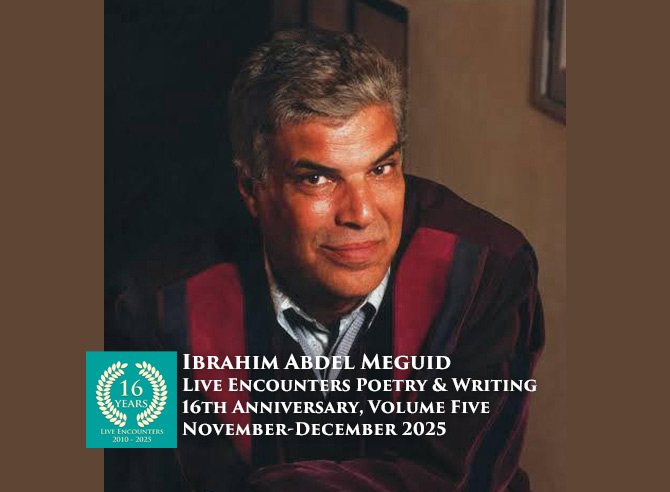
Live Encounters Arab Poetry & Writing 16th Anniversary Volume Five
November- December 2025
Problems with Sitting, story by Ibrahim Abdel Meguid.
Translated from Arabic by Dr. Salwa Gouda.
The new café in the old neighborhood caught his attention with its unusual cleanliness, so he decided it would be his spot to sit, whether alone, with his friends, or with whomever he wished to meet.
The walls were shiny because they were covered with new pink ceramic tiles, and the pillars were even shinier, although the color of the ceramic around them tended towards brown. As for the floor, it was shinier than the walls and pillars, despite the prevailing brown color of its ceramic tiles!
The ceiling had many fans, circulating air that was refreshing and abundant. The place wasn’t crowded in the morning. In the evening, chairs appeared on the sidewalk where the air coming from the north was sweet and delightful!! The man, the café owner, judging by the music he played in the place, seemed to be from another era. At night, he let the voice of Fairuz flow through space, and as the night advanced further, he gave way to the voice of Umm Kulthum. As for evenings and late afternoons, he dedicates a significant portion to the voice of Abdel Halim Hafez. In the morning, after releasing Jiloui incense along with the voice of Sheikh Rifaat or Al-Husary, he gives way to light music. Then, when midday arrives, the voice of Abdel Wahab dominates the time, interspersed with intervals of Eastern music.
People were truly astonished by this beautiful café and how it was free of television. This, according to one of the clever regulars, was reason enough for the absence of the rabble and the riff-raff. Yet, none of the patrons knew what it was about the ceramic on the walls that made the sitter feel a sense of serene innocence.
Umayyad ships sway gently upon it, with small boats “cleaving the sea’s billows,” rising and falling with the waves patiently. Dolphins leap around them, and it often also appears as if there are men and women dancing ethereal, ecstatic dances between light curtains caressed by a drowsy breeze!!
The sitter doesn’t know if this is a magic buried within the ceramic, an effect of the music and the venerable singing voices, or a result of the refreshing coolness of the place?
Furthermore, more than one person tried speaking loudly but didn’t succeed. Just like that, without anyone’s intervention, the voices of the patrons became …lowered, the moment they enter the café. Voices can only be heard by the person they are directed to, and even then, barely. The truth is, the café’s patrons discussed all these strange aspects of the place for a while, but then they became ordinary matters. However, he concealed something he hadn’t told any of the patrons, nor any of his friends, about.
He discovered that he could never sit outside. A magical, gravitational force pulled him to sit inside the café, not among the chairs laid out on the sidewalk. And he discovered that after drinking his coffee and spending time with the magical illusions on the walls and pillars, he would suddenly see the shiny pillars begin to shed their ceramic covering. It would fall off, revealing them as they truly are: grim, made of black cement and grime. Then they, in turn, would slowly crack and crumble. Immediately, the walls would follow suit, collapsing after the ceramic pieces on them fell, their stones scattering. And before the ceiling joined the rest, he would raise his eyes to it and find it still in its place.
This vision didn’t preoccupy him; he thought it was a temporary state that would pass. But it began to repeat with him every day, until he became unable to look at the ceiling, fearing it would fall too.
His friends subsequently noticed that he never sat in the same spot; every day he changed his place inside the café. He did this in a noticeable way. No one asked him, and he couldn’t explain that he was doing it “to avoid this nightmarish vision.” But it began to manifest wherever he sat in the café.
It intensified, no longer happening only after he drank his coffee and had his fill of the beautiful illusions. It now happened as soon as he sat down. He realized it only stopped the moment he stood up to leave; at the instant he paid the bill to the waiter.
Before that, the only way to hide it was by closing his eyes, but soon even that no longer concealed it.
Thus, he became unable to converse with anyone attentively. He tried standing up before paying the bill to the waiter, and the nightmarish vision disappeared. So, he realized the problem was the act of sitting, and in this place, this new, cursed café…
But would he surrender? He decided to avoid the matter with all possible willpower. Why, truly, couldn’t he sit outside the café on the sidewalk? Why should he submit to the hidden force of attraction that pulled him to sit inside the café? He will do it starting tomorrow. It would be better to abstain from the café for a while. Perhaps the whole crisis would end if he talked to someone about it—his wife or his colleagues at work.
But he couldn’t discuss anything with his wife. The moment he entered his apartment and sat down, he saw the walls in front of him collapsing and crumbling. Quickly, he found himself standing up.
“What’s wrong?”
“Nothing.”
His wife asked him, seeing the heavy sweat on his forehead, and she scolded him. She sat down, but he couldn’t sit. He headed to the bedroom, took off his clothes, and lay down on the bed after putting on his pajamas, immediately closing his eyes. He had to recall his past life. He didn’t remember reading anything about madness, nor did he know of a single madman in his family’s history. Perhaps they had hidden it from him, but no one could hide that. Talk about madness cannot be concealed; it has a special allure, often inspiring elaboration and a strange delight, even as it is a complete tragedy. He also hadn’t committed any major sins; he hadn’t even divorced his wife, who was unable to bear children, and he no longer thought about…. having children.”
He married her after a genuine love story, and he now deserves an award for being the soul most capable of retaining the warmth of love. He was even preparing to furnish a nursery where his wife would work, so she would have dozens of children instead of just one.
Therefore, the matter would resolve itself, since he was trying to resist it with a strong will, and since he was the same person who had lived without major misdeeds. He just needed to tell his colleagues at work about it; he would turn it into a funny story.
He eagerly awaited the morning. He barely entered his colleagues’ office and sat down when, before uttering a single word, he saw the wall facing him collapse and crumble onto his colleagues and their spot. He stood up slowly, despairingly, and moved towards this facing wall, sitting behind another desk. Then he saw the first wall crumble and collapse, so he stood up as if stung by a scorpion.
Only three colleagues had arrived at work; they stared at him in silent astonishment. He, in turn, left the entire place and went down to the street, sitting at the first café he encountered in a state of complete despair, lowering his eyes to the ground. But when the waiter came and he raised his eyes to him, he saw behind him all the walls of the houses…
They collapsed with their windows and their shutters, so he left the place without a word, and the waiter followed him with a puzzled look.
The street was long, but it no longer promised any comfort or leisure. He was possessed by a frantic restlessness and was determined to prevail. His eyes began searching for every café along the way. He would resolve to enter a café with genuine will and sit down, but he couldn’t stay for more than a few minutes before feeling as if all the opposite walls were collapsing. He would cling to staying but be unable to, moving from one seat to another, from one corner to the next, pursued by the vision until he would get up and drag himself further down the street to the next one.
He didn’t realize that he had traversed most of the city’s streets, and that the day had passed, yet there were no lights around him; the sunlight still reached him even after it had set in the west. This was the last café he would sit in today, and he would succeed. He sat down, and all the windows opposite collapsed. He rushed out, feeling this time the thunderous sound of the collapse above his head, and he let his legs run, not knowing where all this strength came from. He found himself having climbed an asphalt hill and stopped, tired, looking back. There was no city he recognized there.
And there was no city he recognized there; there was only vast sand, ancient ruins, and endless cemeteries.
© Ibrahim Abdel Meguid
Ibrahim Abdel Meguid is a renowned contemporary Egyptian novelist and writer, born in 1946 in Alexandria. He has authored numerous novels, short stories, and critical works, celebrated for their artistic and social depth, as well as their exploration of diverse human and national themes. Among his many accolades are the Naguib Mahfouz Medal for Literature, presented by the American University in Cairo; the Egyptian State Appreciation Award in Literature; the Katara Prize for Arabic Novel in the Published Novels category for his work “Adagio” in 2015; and the prestigious Nile Prize in 2022. His works have been translated into multiple languages, solidifying his reputation as one of the leading figures who have significantly enriched modern Arabic literature.
 Dr Salwa Gouda is an accomplished Egyptian literary translator, critic, and academic affiliated with the English Language and Literature Department at Ain Shams University. Holding a PhD in English literature and criticism, Dr. Gouda pursued her education at both Ain Shams University and California State University, San Bernardino. She has authored several academic works, including Lectures in English Poetry and Introduction to Modern Literary Criticism, among others. Dr. Gouda also played a significant role in translating The Arab Encyclopedia for Pioneers, a comprehensive project featuring poets, philosophers, historians, and literary figures, conducted under the auspices of UNESCO. Recently, her poetry translations have been featured in a poetry anthology published by Alien Buddha Press in Arizona, USA. Her work has also appeared in numerous international literary magazines, further solidifying her contributions to the field of literary translation and criticism.
Dr Salwa Gouda is an accomplished Egyptian literary translator, critic, and academic affiliated with the English Language and Literature Department at Ain Shams University. Holding a PhD in English literature and criticism, Dr. Gouda pursued her education at both Ain Shams University and California State University, San Bernardino. She has authored several academic works, including Lectures in English Poetry and Introduction to Modern Literary Criticism, among others. Dr. Gouda also played a significant role in translating The Arab Encyclopedia for Pioneers, a comprehensive project featuring poets, philosophers, historians, and literary figures, conducted under the auspices of UNESCO. Recently, her poetry translations have been featured in a poetry anthology published by Alien Buddha Press in Arizona, USA. Her work has also appeared in numerous international literary magazines, further solidifying her contributions to the field of literary translation and criticism.

